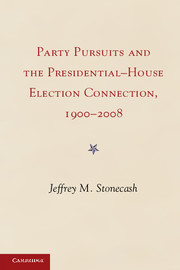Book contents
- Frontmatter
- Contents
- Preface
- Part I Election Patterns and INTERPRETIVE Frameworks
- 1 Disconnecting and Reconnecting Presidential–House Election Results
- 2 The Study of Presidential–House Elections
- 3 Reconsidering Conclusions
- 4 Explaining Change
- Part II Explaining a Changing Relationship
- Appendix I Presidential–House Elections by House Districts
- Appendix II The Presidential–House Relationship and Uncontested Races
- Appendix III Alternative Explanations of Change
- Bibliography
- Index
- References
4 - Explaining Change
The Role of Party Pursuits
Published online by Cambridge University Press: 05 January 2013
- Frontmatter
- Contents
- Preface
- Part I Election Patterns and INTERPRETIVE Frameworks
- 1 Disconnecting and Reconnecting Presidential–House Election Results
- 2 The Study of Presidential–House Elections
- 3 Reconsidering Conclusions
- 4 Explaining Change
- Part II Explaining a Changing Relationship
- Appendix I Presidential–House Elections by House Districts
- Appendix II The Presidential–House Relationship and Uncontested Races
- Appendix III Alternative Explanations of Change
- Bibliography
- Index
- References
Summary
Explaining electoral change as a result of party pursuits begins with the factors that might prompt party candidates to seek change. The decision to pursue change is likely to be driven by the electoral math facing candidates or parties and by concerns with ideology and social trends. Further, there must be some substantial percentage of party members who support such efforts. It need not be a majority, but for a sustained effort to achieve change there must a substantial percentage.
Presidential Candidates: When parties begin campaigns they seek to win a majority. The “wing” of the party that faces the simplest problem is that of presidential candidates. A candidate either wins or loses, and if a campaign is to be run, the focus must be on what will produce a majority in the Electoral College. Presidential candidates invariably begin a campaign with an assessment of what base they can probably rely on and what voters they might be able to win. These calculations can be done with a short-term focus on just the upcoming election or with a long-term focus on pursuing an expanded or different electoral base. Our attention in politics is usually drawn to the short-term strategies of presidential candidates seeking to win the support of specific groups. The concern here is with the long-term and what would prompt candidates to seek to change an electoral base. The process of assessing political prospects may be the same, but the difference is whether the goal is just the next election or more enduring changes. Presidential candidates are very important in any process of change. They are the most visible representative of their party and the most capable of projecting an altered image to the electorate. Presidential candidates cannot change a party's electoral base alone, but they can play a major role.
- Type
- Chapter
- Information
- Publisher: Cambridge University PressPrint publication year: 2012



